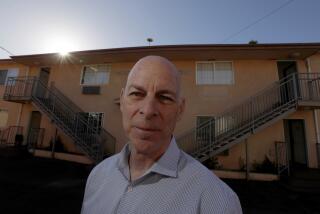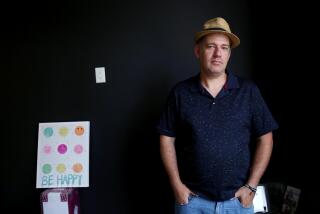Carl Karcher’s Private Deals and Public Fight : Investment: A friendly $13-million venture with builder Maurice Monnig soured, leaving angry home buyers and tax liens.
- Share via
SAN BERNARDINO — Fast-food magnate Carl N. Karcher built his personal fortune on the principle of the gentlemen’s agreement: that business is best conducted with friends and that deals are best sealed with a handshake.
With Southern California’s economy mired in recession, however, that strategy has led Karcher, who founded the Carl’s Jr. fast-food chain in 1941, onto shaky financial ground.
One particular investment epitomizes how Karcher, now 76, has always done business--and how his investments have crumbled.
Since the late 1970s, Karcher has poured $13 million into Monnig Development Inc., a San Bernardino home-building firm that has built about 1,700 modestly priced homes in Riverside and San Bernardino counties.
Company President Maurice J. Monnig, 51, has known the Karcher family for more than 40 years--he once lived just blocks from the Karchers in Anaheim, and he went to school with the oldest Karcher daughter.
Monnig said in a September interview that he and Karcher “had a basic handshake relationship built on mutual trust. . . . That’s the way Carl likes to do business.”
As the real estate market soured, however, Monnig Development collapsed, court records show. The company’s projects are in financial distress, with lawsuits, loan delinquencies and Internal Revenue Service liens pending against many of them, according to court documents.
Though Karcher is a limited partner, liable only for the amount he invested, “I should have never gotten involved,” he said in an interview Friday. “I should’ve been kept better informed. It’s caused me a lot of grief.”
Despite his four-decade friendship with Monnig, Karcher filed suit on June 25 calling for the development company to be dissolved and a receiver appointed to oversee its liquidation. A recent status report in San Bernardino County Superior Court describes the Monnig case as “probably the most complicated and distressed receivership presently pending before this court” and notes that the “records of the partnership are incomplete, unorganized and inconsistent.”
Court documents show that Monnig Development and 11 related partnerships are now insolvent, and that Monnig cannot pay interest and principal for certain loans backed by the Carl N. and Margaret M. Karcher Trust, which holds the couple’s personal fortune. Because the Karcher Trust has guaranteed so much of the limited partnerships’ debt, “every day that the general partners fail to pay creditors, the Karcher Trust’s liability increases,” court documents state.
Several of the partnerships now require immediate attention, the receiver states, especially a troubling situation in which San Bernardino home buyers were involved in trading in their homes to Monnig so that they could buy new houses.
San Bernardino schoolteacher Karla Huesca is one such customer. In January, Huesca said, Maurice Monnig agreed to buy her home so that she and her husband could purchase a house in a Monnig development called The Estates.
The couple received documents showing that their house was sold, Huesca said. But by March, lenders were calling her to say that several mortgage payments had been missed and that she was responsible because her name was still on the deed.
Alarmed, Huesca said, she and her husband tried unsuccessfully to contact Monnig. They finally reached a Monnig Development employee who assured them that Monnig was, indeed, trying to sell their old house but that, because of the real estate downturn, the procedure was moving slowly.
Huesca said this week that the house has still not been sold and that lenders are now foreclosing on it.
“I have a foreclosure next to my name,” said the 34-year-old mother of three. “We can’t buy anything now--we’re just sitting here in this house.”
Several of her neighbors are in the same boat, Huesca said.
According to court documents, the Monnig Development trade-in program worked this way: A buyer of a new house would sell his or her old home to a Monnig partnership, which would obtain financing to purchase the property and also provide money for the down payment on the new house. The loan would be secured by a deed of trust on the buyer’s old home.
In many cases, however, the old home would remain in the buyer’s name, court documents state. Monnig would stop making mortgage payments, causing the homes to go into foreclosure, court documents state.
“The partnerships did not make payments on the loans, and almost all of them are being foreclosed upon. Because the partnership was obligated to make payments of the first trust deed on the old home, the resulting foreclosure negatively affects the buyer’s credit, even though the buyer made all of the payments required of the buyer,” the court filing states.
Les Fogassy, a property specialist for the city of San Bernardino, is one Monnig homeowner whose old house did not land in foreclosure.
“Monnig had this deal where they had a trade-in program. We decided to participate, but nowhere in the deal did they say they were going to assume our loan--they said they were going to buy our home,” Fogassy said.
Escrow on the new house closed, but weeks later Fogassy got a late notice from the mortgage company saying that a payment had been missed on his old home.
“I was furious. I called them right up. Eventually Monnig sold the house and paid off the loan, but what if they hadn’t?” Fogassy said. “I’ve probably been one of the lucky ones.”
Unsold Monnig homes in his neighborhood are left unattended and overgrown with weeds, Fogassy said.
Also, published reports describe complaints as far back as 1989 about the quality of Monnig houses, and a faulty-construction lawsuit filed by 21 homeowners is still pending.
Earlier this year, Karcher hired Steven Huntley, a Sacramento real estate company executive, to help him and Monnig work out problems with their real estate holdings. Huntley, who is president of Huntley Financial Group, describes the housing trade-in offer as “a creative marketing program. It works well in a good market, OK in an average market--and it doesn’t work in a bad market.”
Huntley characterizes Karcher as a passive real estate investor, saying “he would invest in these ventures and not get actively involved.”
Karcher said Friday that he visited Monnig’s San Bernardino housing developments on only a few occasions and was unaware of the complicated home trade-in system.
“I did not know about that until after the fact,” he said.
Maurice Monnig, contacted this week, would not comment on the many problems facing the housing projects. A court hearing on Karcher’s lawsuit against Monnig Development is set for later this month in San Bernardino.
Monnig did speak of Karcher personally, describing him as “someone you hold up as an idol. . . . Carl made it very easy to be involved with him business-wise. Carl’s a very principled guy.”
Court documents filed by Karcher state that Monnig “utilized these personal relationships to develop a fiduciary relationship of trust and confidence between Mr. Karcher and the trust on one hand, and MDI and Monnig on the other hand.” Karcher relied on that relationship of trust, court documents state, when he agreed to back Monnig projects.
Karcher said Friday that he hasn’t spoken to Monnig in months.
Times staff writer Greg Johnson contributed to this report.
More to Read
Inside the business of entertainment
The Wide Shot brings you news, analysis and insights on everything from streaming wars to production — and what it all means for the future.
You may occasionally receive promotional content from the Los Angeles Times.










